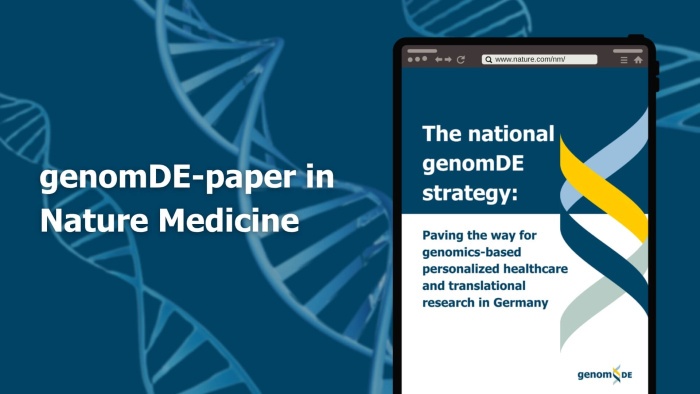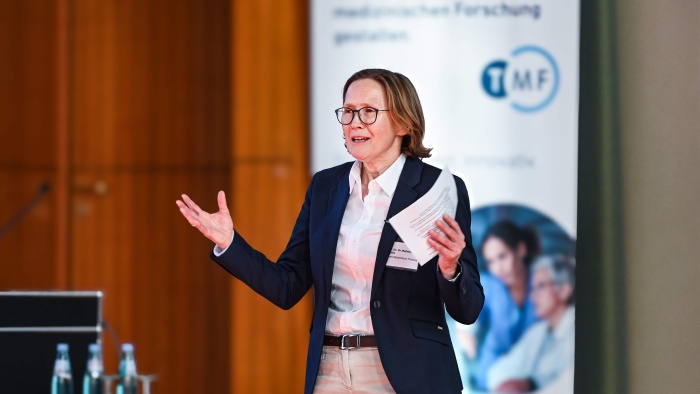10th National Biobanking Symposium: Networking With Large Research Initiatives Is Crucial for the Sustainability of Biobanks
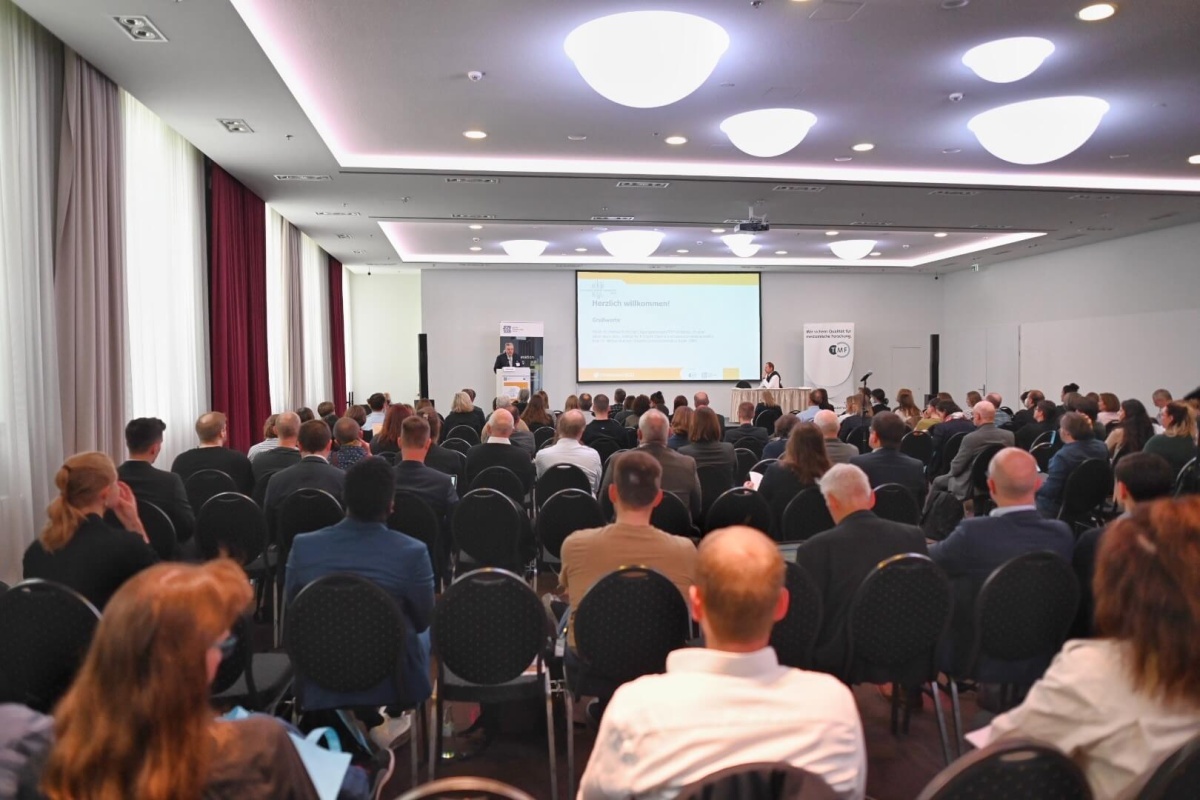
Around 300 biobank experts discussed the latest developments in biobanking at the 10th National Biobank Symposium. © TMF
Biobanks are a fundamental component of medical research. They collect, process, and store biosamples such as blood or tissue and make them available together with relevant data for research projects. "Modern biobanking stands for interdisciplinarity, professional sample handling, and networked interoperability. Standardized collaboration between biobanks and cooperation with networked multi-center research initiatives play a central role here," is what PD Dr. Dr. Michael Kiehntopf, Conference President of the 10th National Biobank Symposium at Jena University Hospital, welcomed the 300 or so participants in Berlin with. Under the motto "Sustainable anchoring of biobanks as research infrastructure," experts exchanged views on the latest developments in biobanking from June 1st to 2nd, 2022. The Technology and Methods Platform for Networked Medical Research (TMF) organized the symposium in cooperation with the German Biobank Node (GBN).
Over the last ten years, biobanks have developed into efficient infrastructures for medical research - not least due to the innovative funding policy of the federal government and funding bodies, which recognized the importance of biobanking for excellent, reproducible research at an early stage. The Federal Ministry of Education and Research (BMBF) has invested heavily in the networking of biobanks in recent years - the German Biobank Alliance (GBA), which now comprises 37 sites, recently celebrated its fifth anniversary.
"Biobanking provides centralized infrastructures, particularly for collaboration in large research networks, and thus offers enormous opportunities for health research," says Kiehntopf.
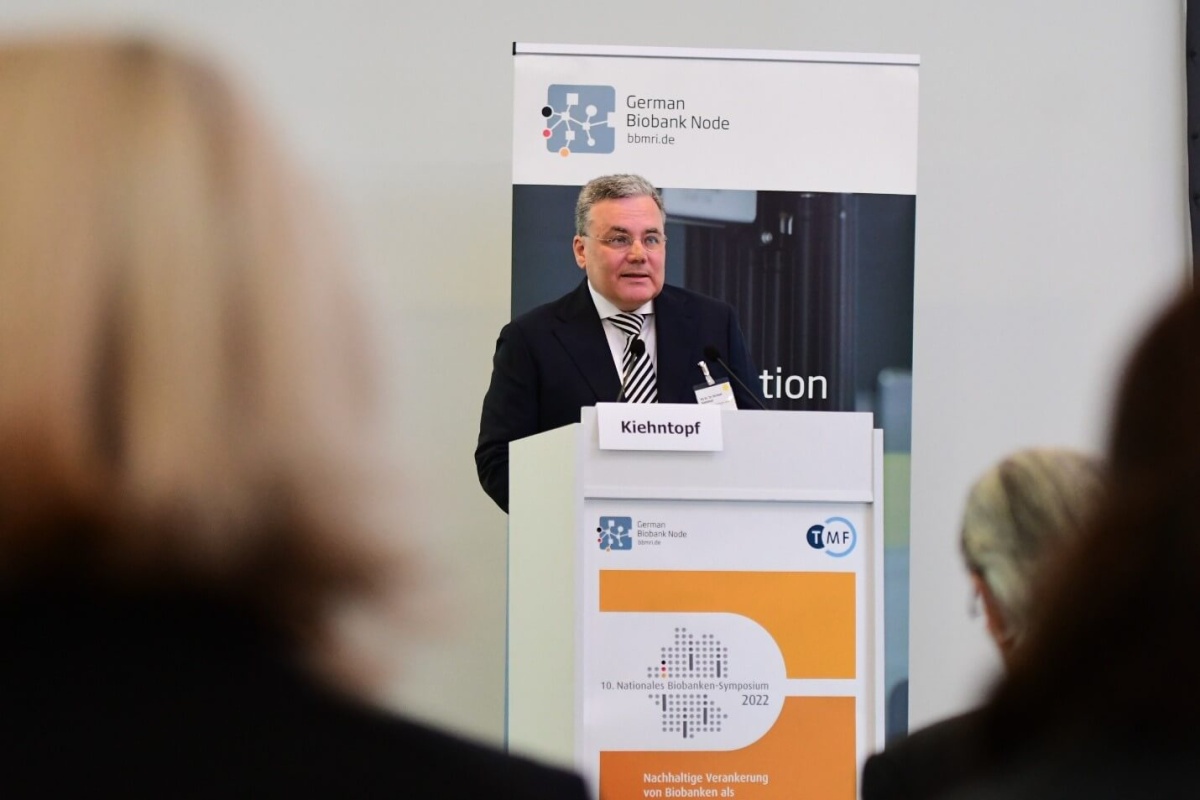
Conference president professor Dr. Michael Kiehntopf opening the 10th National Biobanking Symposium in Berlin. © TMF e.V.
Biobanks in the Network of Large Research Initiatives
The benefits of effective biobanking were particularly evident during the COVID-19 pandemic. For example, the National Pandemic Cohort Network (NAPKON) of the Network of University Medicine (NUM) collected around 420,000 biosamples from over 5,000 patients as part of three cohort studies, which are now being used to systematically analyze the long-term consequences of COVID-19.
In the Medical Informatics Initiative (MII), biosamples and patient data from routine care are to be utilized for research in the future. To do this, biobanks and data integration centers at university medical centers in Germany will be linked at a technical and regulatory level. For this, the project "Aligning Biobanking and DIC efficiently" (ABIDE_MI) was launched in May 2021, involving 24 university medical centers, the MII coordination office, and the GBN.
"Our aim for the future is for researchers in clinics to have a single point of contact in the form of a query and analysis portal that identifies patient cohorts and corresponding biosamples that are suitable for a particular research project and where they can apply to use the data and samples," explained Sebastian C. Semler, the TMF’s Managing Director and Head of the MII Coordination Centre.
For Quality in Biomedical Research
Funding organizations such as the German Research Foundation (DFG) are aware of the importance of biobanks for the quality of biomedical research projects. They are, therefore, committed to more sustainable biobanking.
"High-quality biobanking is an important prerequisite for reliable research results in medicine and biomedicine. In 2021, the Standing Senate Commission on Key Questions in Clinical Research published guidelines for applicants and reviewers that take this aspect into account alongside other quality-enhancing measures," said Dr Katja Hartig, Programme Director of the Life Sciences 3: Medicine Group at the German Research Foundation (DFG). "In addition, we endeavor to ensure that existing professional biobanks are used, and project-specific costs are applied for when advising applicants and in the planning phases of projects."
High-quality biobanking is an important prerequisite for reliable research results in medicine and biomedicine.
Prof Dr. Christopher Baum, Chairman of the BIH Board of Directors and Head of Translational Research at Charité - Universitätsmedizin, spoke out in favor of closer links between existing research initiatives and structures.
Baum emphasized at the biobank symposium: "For higher research quality, improved research efficiency, and measurable benefits for patients, we need stronger networking. We need a master plan of responsibilities in order to create a sustainable link between the world of biospecimens, the medical informatics initiative, and other relevant national and international infrastructures." High-quality biobanking is an important prerequisite for reliable research results in medicine and biomedicine. In 2021, the Standing Senate Commission on Key Questions in Clinical Research published guidelines for applicants and reviewers that take this aspect into account alongside other quality-enhancing measures," said Dr Katja Hartig, Programme Director of the Life Sciences 3: Medicine Group at the German Research Foundation (DFG). "In addition, we endeavor to ensure that existing professional biobanks are used, and project-specific costs are applied for when advising applicants and in the planning phases of projects."
With this in mind, GBN Director Prof. Dr. Michael Hummel would like to see "coordinated networking, standardization, harmonization, and further development of existing infrastructures. In this way, the potential of the GBN and the Biobank Alliance could be further unlocked and developed, links with patient data could be established, and the long-term utilization of samples could be ensured."
Increasing Importance of European Networking
On a European level, biobanks have been networking since 2013 in the European network BBMRI-ERIC. Around 700 biobanks from 23 European member states and the World Health Organisation (WHO) are connected via the BBMRI portal and enable the pan-European exchange of biosamples and data that strengthen medical research.
"Germany has intensively supported and actively helped shape BBMRI-ERIC from the very beginning. Within this network, the GBN, GBA, and TMF play a pioneering role at the European level," emphasized Prof. Dr. Jens Habermann, Director General of BBMRI-ERIC. This engagement in European infrastructure development will become even more important in the future in light of the European Health Data Space planned by the EU Commission for the utilization of medical data for research.
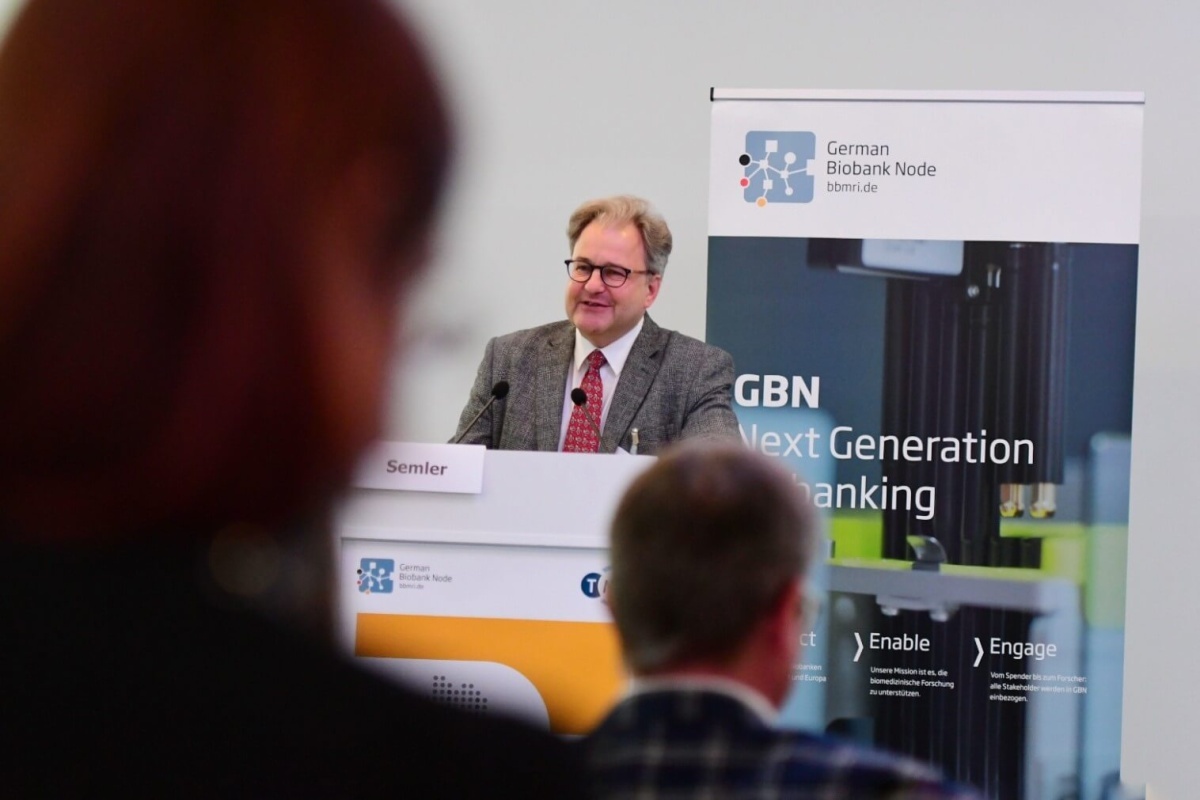
TMF Managing Director Sebastian C. Semler during his presentation on the potential of the Medical Informatics Initiative for genomic medicine. © TMF e.V.
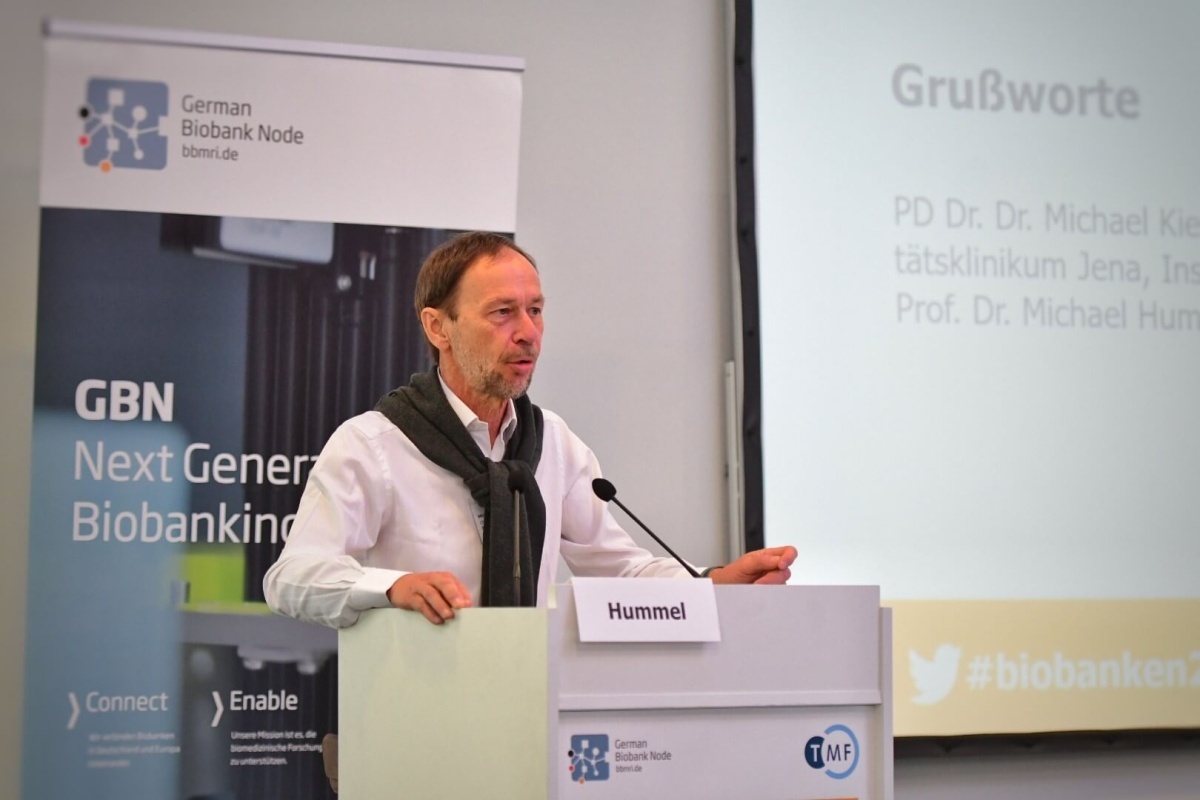
GBN Director Prof. Michael Hummel chaired the session on sustainability. © TMF e.V.
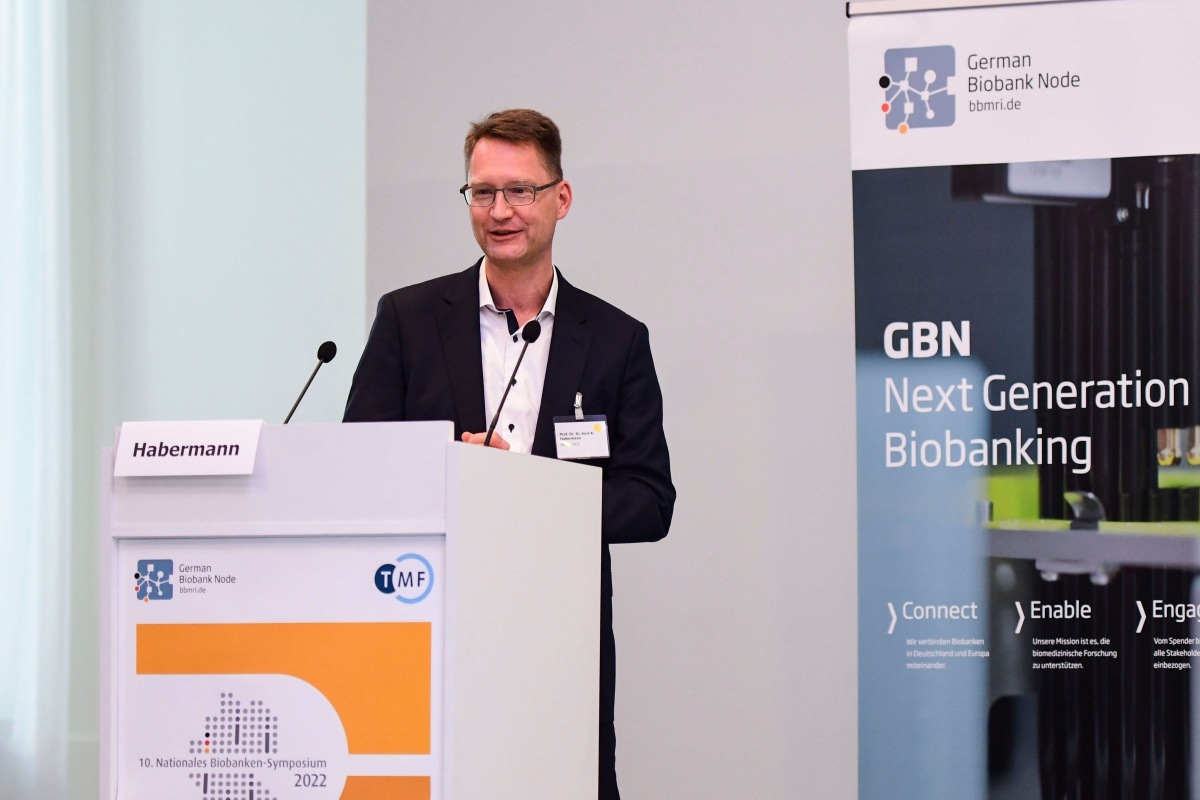
Prof. Dr. Jens Habermann. © TMF e.V.
Press Contact
Wiebke Lesch (TMF e.V.)
Phone: +49 30 2200 24731
Mobile: +49 177 2663257
E-mail: presse@tmf-ev.de
Twitter: @tmf_eV
Verena Huth (German Biobank Node)
Phone: +49 30 450 536 354
E-mail: verena.huth@charite.de
Twitter: @bbmri_de
About the German Biobank Node (GBN)
The German Biobank Node is the umbrella organization of academic biobanks in Germany. Under the leadership of GBN, 37 biobank locations and an IT development center work together to make human biosamples and corresponding data available nationally and internationally for biomedical research. The Federal Ministry of Education and Research (BMBF) funds the work of GBN, which is supported by the German Cancer Research Centre Heidelberg (DKFZ) in the area of IT, as well as the BioMaterialBank Heidelberg (BMBH), and the Integrated Biobank Jena (IBBJ) in the area of quality management. GBN represents the interests of German biobanks in the European biobank network BBMRI-ERIC.
Für aussagekräftige Forschungsergebnisse in der Medizin und Biomedizin ist qualitätsgesichertes Biobanking eine wichtige Voraussetzung.
Further Information

About the TMF
The TMF – Technology and Methods Platform for Networked Medical Research e. V. is the umbrella organisation for collaborative medical research in Germany. The TMF brings together researchers from different disciplines to jointly develop concepts, infrastructures and methods for research. The Biobanks Working Group discusses topics such as the legal, ethical and technical framework conditions for biobanks. In particular, large consortium projects and flagship projects such as the current Medical Informatics Initiative are supported by the TMF in terms of content and organisation through the sponsorship of accompanying structures. By pooling resources, the TMF makes an important contribution to efficient cutting-edge medical research in Germany.
